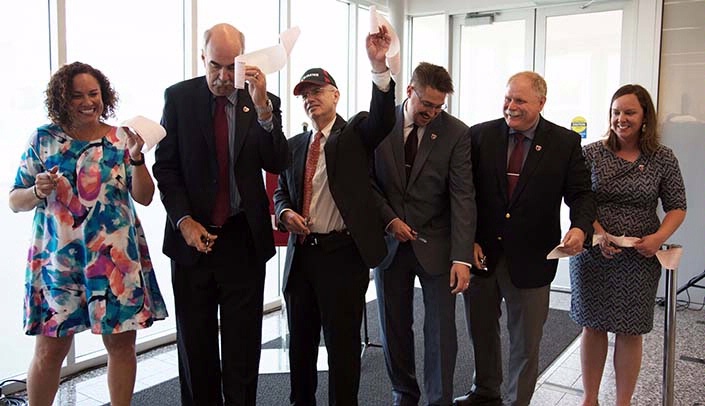The 500-mile wide campus now will be a road more traveled by UNMC.
Open houses
Open houses will be held for the public on the dates below:
- Western region, based in Scottsbluff – June 20, 4-8 p.m. at the Harms Center, Western Nebraska Community College, 2620 College Park;
- Northeast region, based in Norfolk – June 22, 4-8 p.m. at the J. Paul and Eleanor McIntosh College of Nursing, UNMC College of Nursing Northern Division, Northeast Community College campus, 801 East Benjamin Ave.;
- Southeast region, based in Lincoln – June 26, 4-8 p.m., UNMC College of Dentistry, University of Nebraska-Lincoln, east campus, 4000 East Campus Loop South; and
- Central region, based in Kearney – July 14, 4-8 p.m., Younes Convention Center, 416 W. Talmadge Rd.
Wednesday, UNMC held a ribbon-cutting and open house celebration to launch four Simulation in Motion Nebraska trucks (SIM-NE). The customized trucks soon will be deployed and stationed in Norfolk, Lincoln and Scottsbluff, where the College of Nursing has programs, as well as Kearney, where both the Colleges of Allied Health Professions and Nursing have a presence.
Speaking at the event while donning a SIM-NE hat, UNMC Chancellor Jeffrey P. Gold, M.D., said the SIM-Nebraska project will help save lives and take world-class health care on the road.
“When the first life is saved, when the first child that would have had long-standing or life-long disability is prevented from having that, when somebody falls or gets injured in an agricultural or ranching setting, gets access to world-class health care that he or she would not have had previously, we’re changing the world one day, one incident, one phone call at a time. So this is really magical,” Dr. Gold said.
The customized trucks, funded by a $5.5 million grant from The Leona M. and Harry B. Helmsley Charitable Trust, feature high-tech simulation and real-life training experiences. The training is free and targeted to rural emergency medical service agencies and rural critical access hospitals.
About the trucks
The trucks feature dual slide-out room extensions, a simulated emergency room and an ambulance, as well as computerized mannequins that talk, breathe, have heartbeats and can react to medications and other actions of the learners. They can die and be revived over and over again.
Each mobile unit is outfitted with supplies to recreate a realistic environment for learners which includes: pre-programmed computerized medical and trauma scenarios; monitors that display vital signs of patient simulators; and audio and video recording/playback capabilities.
Participants will use real medical and rescue equipment that includes airway management equipment, cardiac monitor/defibrillators, medications, intravenous supplies, stretchers, immobilization devices and resuscitation equipment.
Paul Paulman, M.D., UNMC assistant dean for clinical skills and quality, is principal investigator of the grant. Jennifer Adams, M.D., UNMC assistant professor of anesthesiology, is co-investigator.
“The vehicles will help improve and increase the training opportunities for health professionals in their home communities,” Dr. Paulman said. “In my family, training and supporting emergency medical services is very personal. My wife’s father died helping one of his neighbors when she was a very young child, and he was on an EMS call so this project fits into what we like to do.”
SIM-NE Program Manager Brian Monaghan said SIM-NE will reach out to health care professionals in rural and frontier parts of the state.
“The SIM-NE program will take education and technology to the learners in their home communities, rather than having them travel to the larger cities to take advantage of these resources. It allows everyone to learn and practice as a team,” he said.
The grant will fund the program operation for three years with 100 percent funding the first year, 66 percent the second year and 33 percent in the third year. Private funding, partnerships, fee for services and state and federal grants will be sought to sustain the project.
